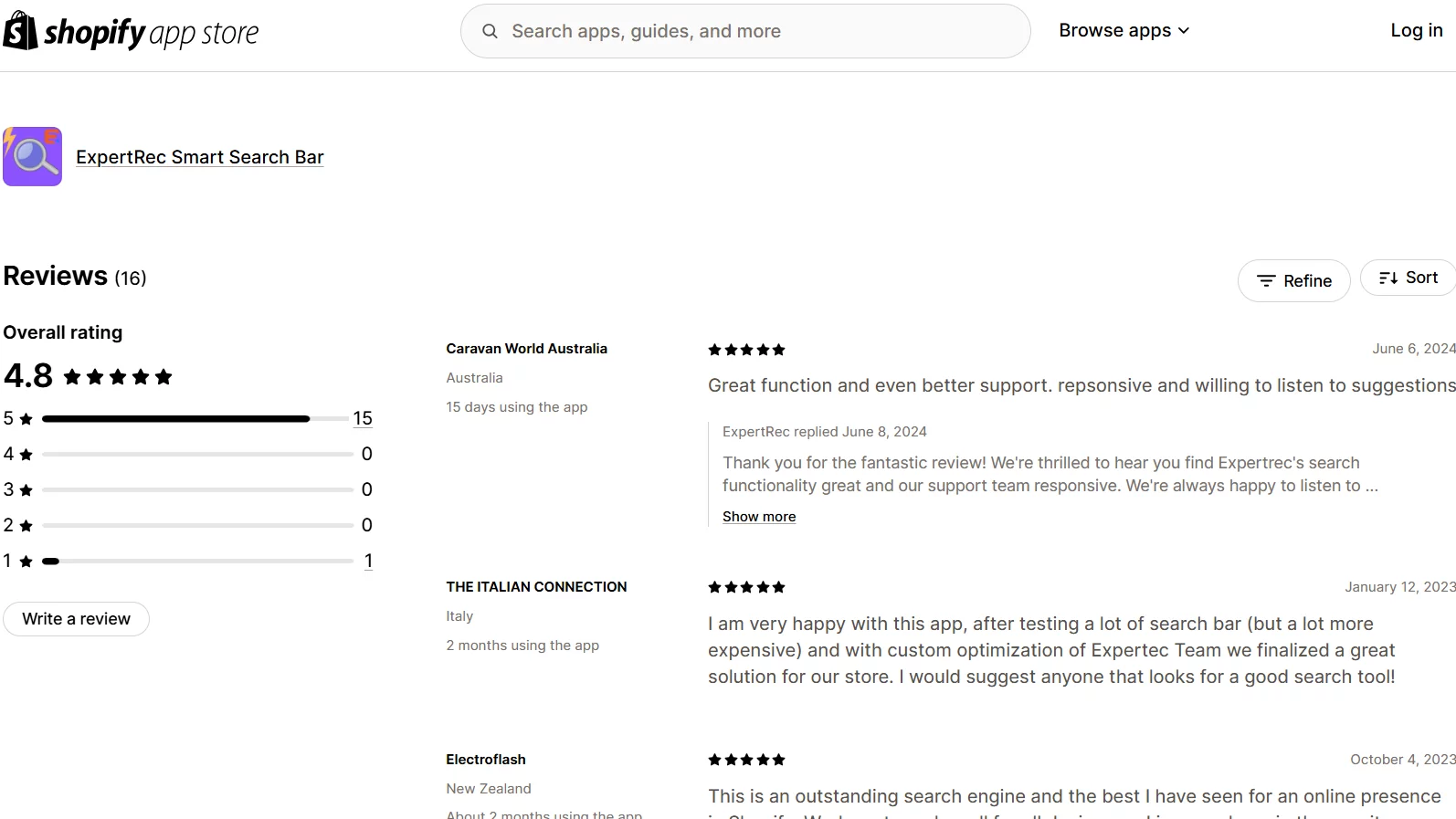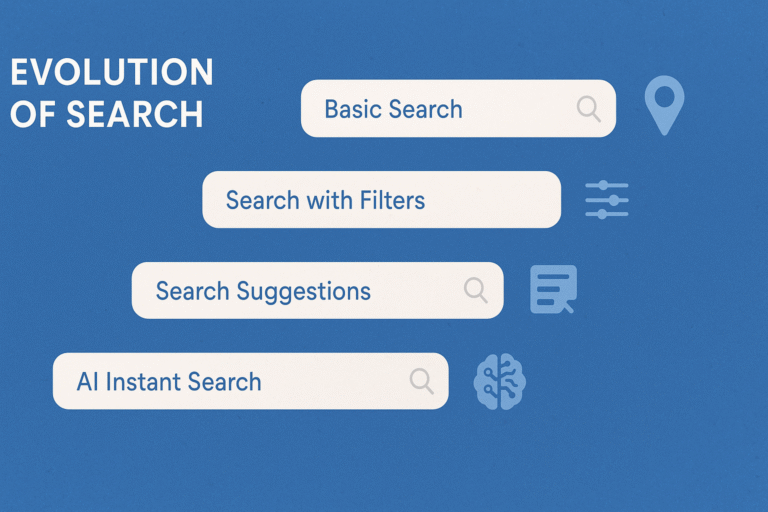Search technology has come a long way. From the early days of clunky keyword matching and static results to today’s AI-enhanced, personalized, and intuitive systems – search has transformed into one of the most vital elements of user experience, especially in eCommerce.
But how did we get here? And where are we going?
This blog will walk through the evolution of search, evaluate whether traditional methods still hold up, explore modern alternatives, and introduce how platforms like Expertrec are driving the next phase of search innovation.
Phase 1: Keyword-Based Search – The Early Days
The earliest form of search engines worked on a basic principle: exact keyword matching.
Whether it was a library database or an early web search engine like Archie or AltaVista, the idea was simple—if your search term matched a word in the database, it returned the result.
Key Characteristics:
-
Literal keyword matching
-
Rigid syntax (misspellings = zero results)
-
No understanding of context or intent
-
Static and rule-based indexing
While groundbreaking at the time, this model had major limitations:
-
Couldn’t handle synonyms or plurals
-
Missed the nuance of natural language
-
Ignored user behavior or preferences
For businesses and users alike, it meant frustrating experiences and missed opportunities.
Phase 2: Full-Text Search and Boolean Logic
As digital content grew, so did the complexity of search. This phase introduced more powerful full-text search engineswith features like Boolean operators (AND, OR, NOT), stemming (root-word matching), and indexing for speed.
Platforms like Elasticsearch emerged for developers, offering robust control over how search worked behind the scenes.
Pros:
-
Faster results
-
Better indexing of large data sets
-
Support for complex queries
Cons:
-
Still lacked true understanding of intent
-
Required technical configuration
-
Not user-friendly for non-experts
For eCommerce, this phase improved product search slightly—but it still required manual tuning, rule-writing, and often failed to deliver relevant results for long-tail queries or misspellings.
Phase 3: Semantic Search and Natural Language Processing (NLP)
The next major leap came with semantic search – systems that understand not just the words, but the meaning behind them. Powered by Natural Language Processing (NLP) and early machine learning models, search engines started to become “smarter.”
Now, instead of simply matching words, search could:
-
Understand synonyms and context
-
Interpret user intent
-
Handle conversational queries
-
Manage typos and pluralizations
This laid the foundation for intelligent assistants like Google Assistant, Siri, and Alexa—tools that interpret your intent rather than just match your keywords.
In the eCommerce world, semantic search started to improve product discovery. Shoppers could now type in natural phrases like “red running shoes under $100” and get accurate results—something keyword search often failed to deliver.
Phase 4: AI-Driven and Personalized Search
We are now in the age of AI-powered search.
This current phase leverages advanced machine learning, behavioral data, and real-time analytics to deliver dynamic, personalized, and predictive search experiences.
Features of Modern AI-Powered Search:
-
Learns from user behavior (clicks, purchases, time on page)
-
Ranks results based on conversion potential
-
Offers autocomplete, typo-tolerance, and real-time indexing
-
Dynamically adjusts results for trends, seasonality, and inventory
-
Personalizes results based on user profiles and intent
With AI, search is no longer static. It evolves with your business, your users, and your data.
This evolution has completely changed what’s possible in eCommerce—where search has become a key driver of conversion, engagement, and revenue.
Is Traditional Search Still Worth It?
While older search systems may still work for very small or static websites, they struggle to keep up with today’s user expectations:
-
Shoppers expect real-time, relevant results—instantly.
-
They use mobile devices, voice assistants, and natural queries.
-
They bounce quickly if they don’t find what they need in seconds.
-
They expect a personalized experience, not generic results.
In this environment, using outdated or rigid search systems means lost conversions, poor UX, and missed opportunities.
Are There Better Alternatives?
Yes. The good news is that modern alternatives exist—search engines that combine the best of AI, automation, and customization, without the complexity.
These tools offer:
-
Plug-and-play integrations with eCommerce platforms
-
No-code interfaces for customizing results
-
AI-based ranking and product promotion
-
Analytics dashboards to track performance
-
Support for autocomplete, voice search, typo tolerance, and more
And one platform that does this exceptionally well is Expertrec.
Why Expertrec Stands Out in the New Era of Search
Expertrec is built to meet the demands of modern users while staying accessible for businesses of all sizes. It combines the power of AI with the simplicity of a no-code setup—bringing next-gen search to everyone.
What Makes Expertrec Different:
-
Fast and lightweight: Search results load in milliseconds.
-
Intelligent ranking: Products are ranked based on user behavior, popularity, and business logic.
-
Customizable UI: Change design elements without writing a line of code.
-
Real-time indexing: Add new products or update listings instantly.
-
Mobile-optimized: Built to work smoothly on all screen sizes.
-
Multi-platform integration: Works with Shopify, WooCommerce, Magento, BigCommerce, and more.
Whether you’re a startup or a growing brand, Expertrec brings the latest in search technology—without enterprise-level pricing or setup headaches.

Final Verdict: The Future of Search Is Intelligent, Not Expensive
The evolution of search has moved from simple keyword matching to intelligent, AI-driven experiences that understand context, behavior, and business goals.
If your eCommerce business is still relying on outdated search tools, you’re not just behind—you’re potentially losing customers every day.
Modern users demand relevance, speed, and personalization. And platforms like Expertrec make it possible to deliver all three—without the complexity or cost of enterprise search solutions.
Final Takeaway:
Search has evolved. So should your business. Don’t let outdated tools limit your growth. With Expertrec, you get a modern, scalable, and affordable search engine that evolves with your users.
Frequently Asked Questions (FAQs)
The evolution of search refers to how search technology has progressed—from basic keyword matching to advanced AI-driven systems that interpret intent, personalize results, and adjust in real time based on behavior and data.
Q2. Why is understanding search evolution important for eCommerce?
Understanding how search has evolved helps businesses choose tools that meet modern user expectations. Sticking with outdated systems can lead to poor UX and lower conversions.
Q3. What features define modern search platforms?
Modern platforms offer typo tolerance, autocomplete, AI-based ranking, real-time indexing, and personalization based on user behavior.
Q4. How does Expertrec fit into this evolution?
Expertrec combines AI and simplicity, offering a no-code, scalable search platform tailored for eCommerce. It brings next-gen search to businesses of all sizes.
Q5. Is AI-based search better than rule-based search?
AI-based search is more dynamic, scalable, and user-focused. While rule-based search offers control, it lacks the adaptability and intelligence of AI systems.
Q6. Can I integrate Expertrec with my existing eCommerce site?
Yes. Expertrec supports integration with major platforms like Shopify, WooCommerce, Magento, and more—no coding required.




